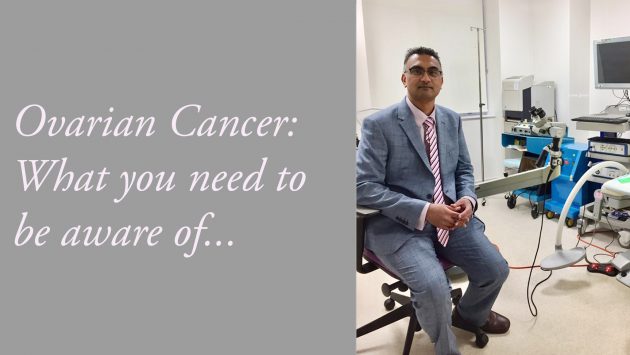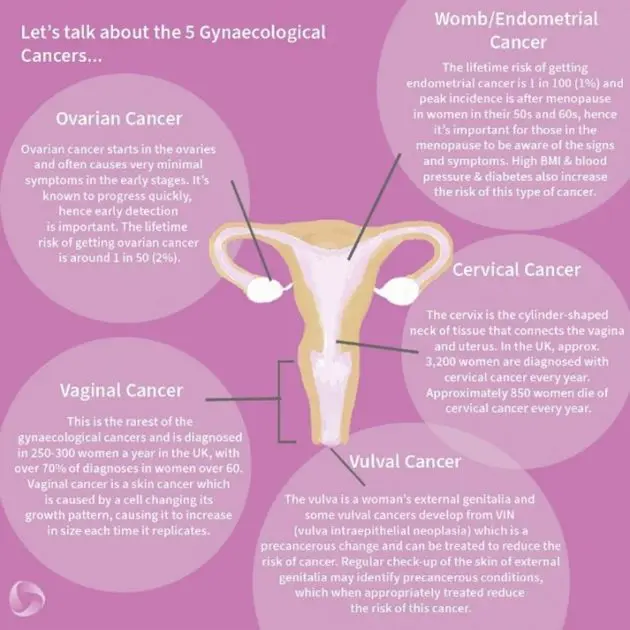
Ovarian Cancer: What you need to be aware of
Amid times of uncertainty that Coronavirus/Covid-19 brings, it is important that we continue to highlight the conditions and illnesses that affect women every day.
March is Ovarian Cancer Awareness Month and to gain more understanding of this type of cancer which affects approximately 7,500 women in the UK every year, Consultant Gynaecologist and Gynaecological Oncologist Mr Saurabh Phadnis answers your most commonly asked questions.
What is Ovarian Cancer?
Ovarian cancer is when abnormal cells from the ovary grow in an uncontrolled way.
The ovaries are a pair of small organs located low in the tummy. Connected to the womb, the ovaries store a woman’s supply of eggs. It is believed that most cases of ovarian cancer arise from the fallopian tube, hence the term “tubo-ovarian cancer”.
What are the symptoms?
B – Bloating that doesn’t come and go
E – Eating difficulty and feeling full more quickly
A – Abdominal and pelvic pain that you feel most days
T – Toilet changes in urination or bowel habits
If you have any of these symptoms that are persistent you should seek immediate medical help with your GP
Can it be prevented?
There is not a screening programme for ovarian cancer. 10-15% of tubo-ovarian cancer is genetically linked. If you are found to be carrying a gene that predisposes you to ovarian cancer, you may be offered risk reducing surgery to remove ovaries at an appropriate age.
How common is it?
Approximately 7,500 women are diagnosed with ovarian cancer in the United Kingdom each year. It is the 6th most common cancer in women.
Who is most affected/more at risk?
Ovarian cancer is more common with older age and your risk increases if you have any of the following:
- Inherited genes that increase the risk of ovarian cancer include faulty versions of BRCA1 and BRCA2
- Women who have had breast cancer in the past
- Using hormone replacement after menopause
- Smoking, exposure to asbestos and radiation
- Certain medical conditions such as endometriosis and diabetes have an increased risk as does being overweight
If there is a family history of this type of cancer, does this make a person more at risk?
Yes, approximately 10-15% of ovarian cancer is linked to faulty genes. A fault in genes such as BRCA1, BRCA2, RAD51C, RAD51D and BRIP-1 are known to be linked with ovarian cancer.
Does advanced stage 3 and 4 mean there is no cure?
Not at all. About 25% of patients with advanced stage ovarian cancer are cured. With advances in treatment, many patients (35%) are living longer than 10 years. In approximately 66% patients the cancer comes back within 2 years.
What is the treatment?
The treatment of ovarian cancer is a combination of surgery and chemotherapy. Even in advanced stage it is possible to offer surgery initially (also called primary cytoreduction surgery) to removes all sites of cancer followed by 6 cycles of chemotherapy. The aim of surgery is to not leave any cancer behind that is visible to the naked eye. If this is not achievable, then 3 cycles of chemotherapy are given initially followed by surgery (also called interval cytoreduction surgery) and then another 3 cycles of chemotherapy.
What is the survival rate?
The survival rate depends on the stage of cancer. More than 75% of women are alive at year 1, where are overall survival is 35% at the end of 5 years.
What can a patient expect during a consultation?
A consultation will include history taking, examination and relevant investigation such as an ultrasound scan of the pelvis. Occasionally further investigations such as examination under anaesthesia are necessary for diagnosis or planning treatment.
Make an appointment
We are currently only able to offer telephone consultations (virtual/video appointments) where appropriate, with Mr Saurabh Phadnis or any other member of the London Gynaecology team. Please call 020 3820 0040 or email [email protected] to find out more.
Please note: If you have symptoms such as; abnormal smear, abnormal bleeding, pelvic pain, abdominal mass or pain or bleeding in early pregnancy, please call us as we may be able to see you in the clinic on a case by case basis. We will need to assess your suitability before an appointment is made.


